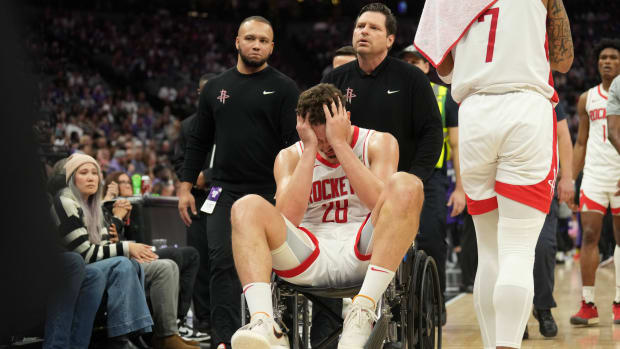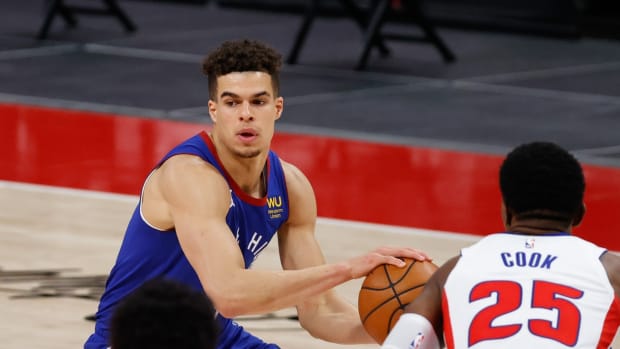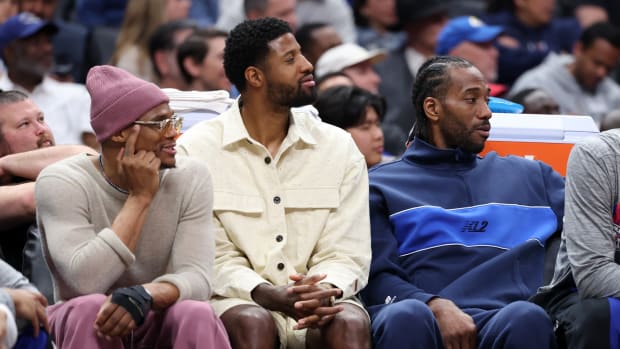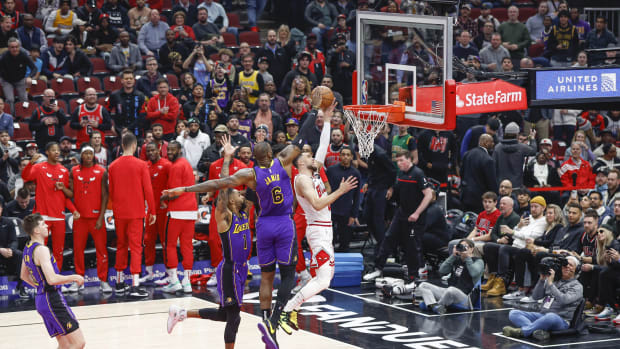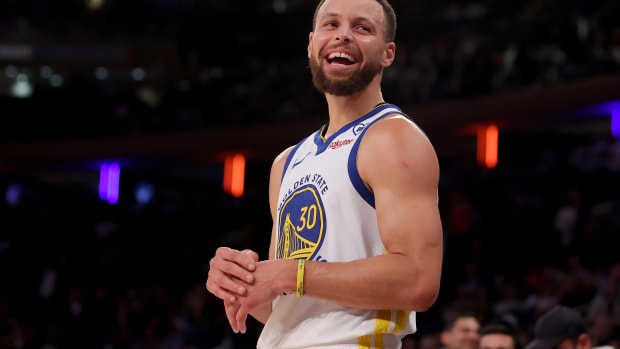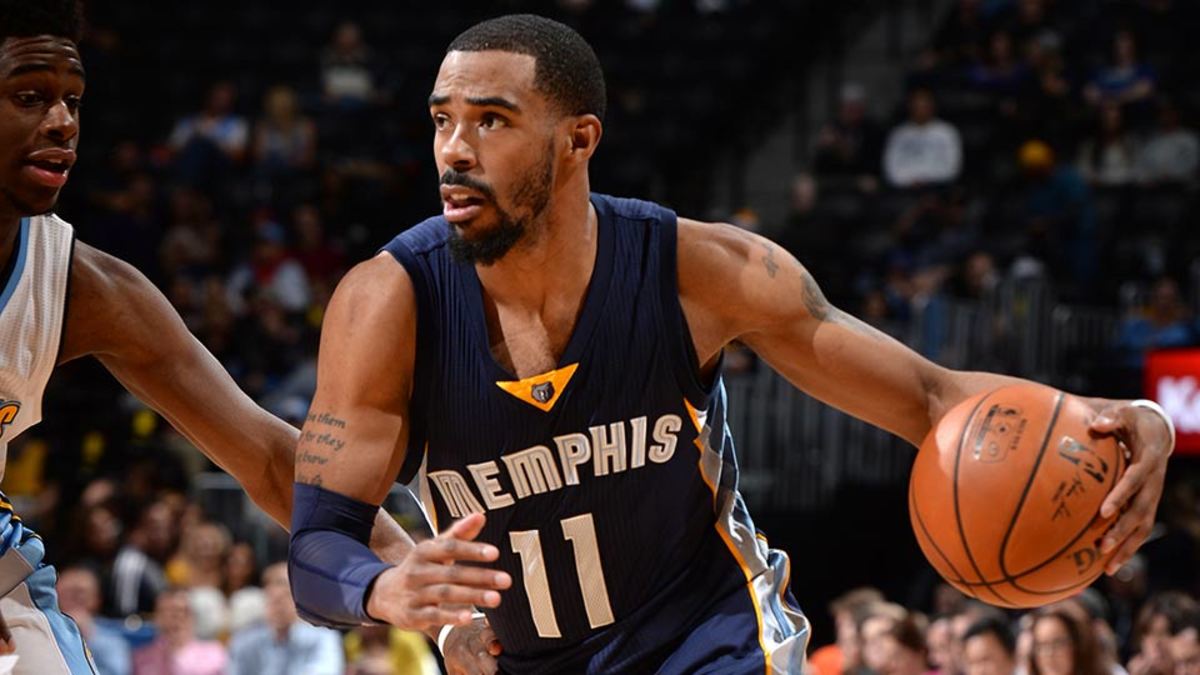
NBA free agency's scarcest resource? Trustworthy point guards
Your teams. Your favorite writers. Wherever you want them. Personalize SI with our new App. Install on iOS or Android.
The NBA’s point guard renaissance won’t quite make it to market. Nearly all of the league’s best ball-handlers are working comfortably for title contenders or locked in on multi-year deals. Mike Conley, a career Grizzly, is the lone exception—a terrific floor general for an offense of any kind and a committed, pesky defender. Landing Conley as a free agent this summer would be an organizational boon. Missing out won’t only represent a lost opportunity to add a star guard, but also a stagger into the most glaring deficiency of the 2016 free agent class.
Headlining the Conley alternatives available to be signed: a mercurial playmaker who can neither shoot nor defend; a declining shadow of an All-Star known to grow moody; a flashy creator with no concept of efficiency; and backups of all kinds who would likely be underqualified for a regular starting role. Should Conley take his time to mull the offers presented him, his suitors could be trapped on the line while even that lacking crop is picked over. For a team with cap space in a competitive market, the only thing worse than being turned down is to be kept waiting.
No matter how long Conley takes to reach his decision, one of his failed suitors could end up in a precarious position. Memphis and Dallas have the most to lose. The former desperately needs to retain Conley to be at all competitive in the West and has no depth to speak of. The latter has no presumptive starting point guard under contract, could lose its starter from last season (Deron Williams) in free agency, and would not sign the most productive alternative candidate (Rajon Rondo) under any circumstances. Both were done a favor by the NBA’s recent swirl of trade activity. In the last week, Indiana, Utah, and New York—all plausible candidates for Conley’s services—each acquired an accomplished point guard via trade. Atlanta, too, seemingly moved on from Jeff Teague by promoting Dennis Schroder.
• Kevin Durant and who? Top 50 players in the 2016 NBA free agency
Conley will still draw plenty of interest, albeit from fewer teams desperate for his services. San Antonio could make good sense, for Conley and the franchise both, if the Spurs would be willing to clear the needed cap room. Houston could make a reasonable case for Conley as a missing piece. Milwaukee, too, might have interest, though the 29-year-old Conley might not have much interest in joining a young team in its gradual ascent. His best options appear to be the most straightforward: the Grizzlies offer a chance to build on existing relationships (including his lasting friendship with Marc Gasol) with incredible financial gain while the Spurs could give Conley slightly less occupational certainty but the greatest chance to win. Every other team pitching Conley is caught in the middle, hoping desperately that his decision might be turned by some niche factor of vague promise.
Given what we know of Conley, we have reason to expect his return to the Grizzlies. It was only a year ago that Conley himself pitched for Gasol’s return and the virtues of working in tandem. Moving on so soon after sending that kind of message would be uncharacteristic for Conley, no matter his interest in competing at the highest levels. The Spurs option—should it realistically be on the table—must be enticing. Yet the very possibility would require that San Antonio trade away some rotation pieces (say, Danny Green, Patty Mills, and Boris Diaw) just to make the math work. And even then, Conley would be stuck in the awkward position of displacing franchise legend Tony Parker. There are already reported hints that Parker’s presence could be a bit of a hangup for Conley.
• Who wants to pay Hassan Whiteside? Examining best fit for FA center
It would also be foolish to ignore the financial divide between Conley’s potential offers. For younger players, the difference between a four– and five–year deal is mitigated by future earning potential; even though a fifth year might not be guaranteed, the possibility of making up the difference on the next deal can mitigate some of the value. This is as big as it gets for Conley. A five–year max offer from the Grizzlies would be worth $153 million overall and $34.6 million in its final year. That’s far more than a 33–year–old Conley could likely pull; smaller guards tend not to age well, and Conley’s rash of injuries over the past several seasons doesn’t suggest he’ll defy the precedent.
Predicting what Conley might otherwise make in the 2020–2021 season—which would be his fifth under contract—is made impossible by the uncertainty of the NBA’s collective bargaining. A new agreement is likely to be in place by then and would bring with it new guidelines for salary cap structure and player salary. Even if the next CBA is more generous to top-end players, Conley probably won’t be in a position at that age to take advantage of it. A fifth year from the Grizzlies is a sure $34.6 million minus taxes and commissions. A four–year max is still big money ($113.6 million in all), but ends with a shot in the dark that could cost Conley around $15 million.
This could be good news for the Grizz of next season, but costly news for the Grizz down the line. NBA contracts are never really indicative of season-to-season compensation even though they’re structured as such. Conley is a case in point; if Memphis does manage to re-sign Conley, it will likely be committing five years of salary for what could be three or four years of star-level play. Market competition inflates salary, as does the timing of a player’s free agency. Conley is still close enough to his prime to be a big-time, long-term earner for the payoff of a few seasons. There isn’t a chance that his fifth–year play would live up to his hypothetical fifth-year salary because it was never really intended to.
Should Conley follow the financial incentives back to what has been a healthy, productive work environment in Memphis, San Antonio would move on to court other quality players at other positions. The Spurs don’t need a point guard so much as they need spot upgrades. Conley over Parker would qualify, but so would others well within San Antonio’s spending range. Dallas wouldn’t be so lucky. Unless Conley has an unparalleled appreciation for the work of Dirk Nowitzki and Rick Carlisle (and who could blame him if he did?), it seems increasingly likely that the Mavericks might roll back one of Williams or Raymond Felton to start at the point next season, unless they make an offer to Jeremy Lin that might well still run them eight figures.
• Open Floor Podcast: NBA draft winners/losers, strange moves, more
The dominoes fall from there. Rondo could make for a third point guard (after Conley and Williams) to return to Sacramento this summer, even if he has to wait for the Kings to be turned down and blown off by other free agents first. The reserves are even more difficult to predict; that market could run wild for players like Lin and Dellavedova, in part because the next tier of options (Brandon Jennings, Greivis Vasquez, JerrydBayless, etc.) is distinctly less reliable—particularly if overplayed as a starter.
• USA Basketball's roster for Rio falls well short of Dream Team status
Playing the trade market is a riskier strategy that could pay off. Moar every team has cap space, but as the cap goes up so, too, do proportional expectations. Players will be expecting and demanding more than they ever have before, especially after seeing what players they believe to be their equals are paid elsewhere. Some teams will need to unload salary to make the necessary room, and others will need to unload salary to be players in free agency at all. Might a guard like Patty Mills be gettable? Or Cory Joseph, should the Raptors take a bold approach to their off–season? It’s a long shot, but not entirely off the table. Ricky Rubio and Brandon Knight also seem available for the right price, though PG–needy teams like Dallas and Sacramento share in their fairly limited trade assets for a deal of that magnitude.
This is why teams in their position will aim to meet with Conley, just in case. Neither is the favorite to secure a deal or even all that compelling an alternative on paper; Conley can otherwise find more money within the comforts of an organization he knows well or contending prospects with the most successful franchise in recent NBA history. The long shot is still worth the trouble for the small chance to avoid settling with a lesser free agent or improvising through an offseason of trade talk. To sign Conley is the only safe, reliable way out of a point guard need this summer. Any other course is subject to the waves of a wild marketplace inside a shallow talent pool.






























